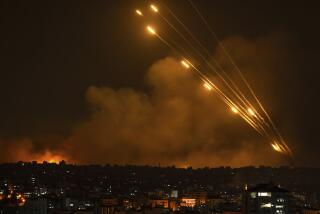Parents Rejoice That War Is Over and Five Are Safe
- Share via
Maria Martinez quit crying and Steve Reyes began. Ramon Sandoval Sr. couldn’t believe the news and Irene Yracheta not only believed, but was changed by it.
The fighting is over and the boys of La Verne--Adrian Yracheta, 22, and William Martinez, 20, both of the 82nd Airborne Division; Timothy Reyes, 20, of the Navy SEALS, and Manuel Castro, 23, and Ramon Sandoval Jr., 23, both of the Marine Corps--all are coming home.
Safe.
“All I want to do is be able to touch him, to hug him,” Yracheta said of her son. “It’s been a year since I’ve seen him.”
William’s mother, Maria, has traded in a white towel--which she used to dab away her tears Wednesday night when she heard of a death in her son’s unit--for a grin that hasn’t left her face since the fighting stopped.
And Steve Reyes, a man who had left the talking and crying in the family to wife Rachel, finally broke down on the front porch as he talked about his son’s return.
“I can’t believe he is coming home,” he sobbed.
When the Iraqis agreed to the cease-fire, Rachel Reyes, the unofficial leader of the La Verne parents, began talking of going to Florida to meet her son’s ship, the Saratoga, when the aircraft carrier returns from the Gulf. But in the midst of celebrating the other evening, husband Steve stopped such talk.
“Ah, honey,” he reminded her, “remember that Timmy wanted to come home together with William (Martinez, his closest friend). He told us not to come and meet the ship.”
That did not dampen Rachel’s joy.
“OK, OK,” she replied, “but my Timmy’s coming home.”
She then unveiled a large stuffed bear, purchased at a market under Timmy’s name, and placed it on the dining room floor. The bear has been dubbed “Kuwait.”
The good feelings created by the cease-fire have been passed neighbor to neighbor over the back-yard fence, in nightly prayer meetings and at the neighborhood bars.
One of Rachel’s sisters, Elizabeth, reported that the women at her church on Olympic Boulevard were abuzz with talk of the boys’ good fortune.
“Praise the Lord,” she exclaimed.
Ramon Sandoval Sr. called La Verne neighbors from his job in Baja California to verify the news. “He was really excited and that’s something for him,” said one friend of the father with the steely demeanor.
Even minor flooding caused by the ongoing downpours didn’t faze the street.
“Rain?” bellowed La Verne resident Jose Gutierrez, “hell, who worries about that? It’s just liquid sunshine, another sign that the boys pulled through.”
The end of the fighting finally gave Irene Yracheta, a private woman, an opportunity to publicly admit a difference that had set her apart from the other La Verne mothers. She was against the war.
“I hated the world,” she said. “I was angry with Saddam and George Bush for sending my boy over there. I was against the war. I didn’t believe in fighting someone else’s battles over there.”
Unlike the other La Verne parents, Yracheta turned into a recluse during the conflict, shunning reporters, friends and, at times, even her two other children.
“All I had to do was to reach out to people, but I didn’t,” she said later.
With the war’s end, however, Yracheta’s guarded demeanor has turned giddy. In hoping for her son’s quick return, Yracheta echoed a sentiment repeatedly heard since the fighting ended in the Persian Gulf.
“I’ve changed. We’ve all changed,” she said. “We take so many things for granted. I’ll never be the same again.”
More to Read
Sign up for Essential California
The most important California stories and recommendations in your inbox every morning.
You may occasionally receive promotional content from the Los Angeles Times.













